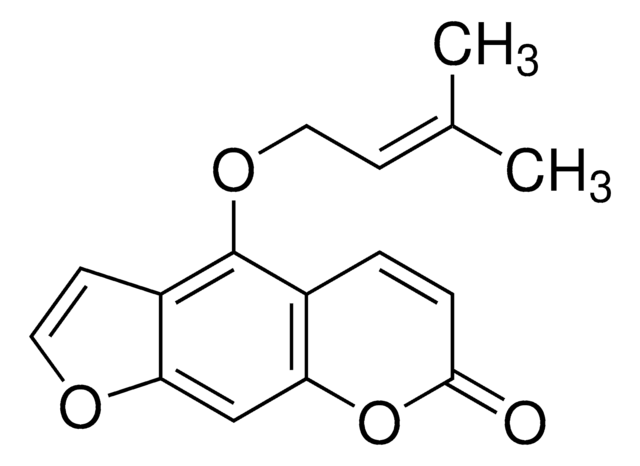I6659
Imperatorin
≥98% (HPLC), powder
Synonym(s):
8-Isopentenyloxypsoralene, 9-(3-Methylbut-2-enyloxy)-7H-furo[3,2-g]chromen-7-one, 9-[(3-Methyl-2-buten-1-yl)oxy]-7h-furo[3,2-g][1]benzopyran-7-one, Ammidin, Marmelide, Marmelosin, NSC 402949
About This Item
Recommended Products
Quality Level
Assay
≥98% (HPLC)
form
powder
color
off-white to light brown
solubility
DMSO: ≥5 mg/mL
storage temp.
2-8°C
SMILES string
C\C(C)=C\COc1c2OC(=O)C=Cc2cc3ccoc13
InChI
1S/C16H14O4/c1-10(2)5-7-19-16-14-12(6-8-18-14)9-11-3-4-13(17)20-15(11)16/h3-6,8-9H,7H2,1-2H3
InChI key
OLOOJGVNMBJLLR-UHFFFAOYSA-N
Looking for similar products? Visit Product Comparison Guide
Biochem/physiol Actions
Features and Benefits
Signal Word
Warning
Hazard Statements
Precautionary Statements
Hazard Classifications
Acute Tox. 4 Oral - Eye Irrit. 2 - Skin Irrit. 2 - Skin Sens. 1 - STOT SE 3
Target Organs
Respiratory system
Storage Class Code
11 - Combustible Solids
WGK
WGK 3
Flash Point(F)
Not applicable
Flash Point(C)
Not applicable
Personal Protective Equipment
Certificates of Analysis (COA)
Search for Certificates of Analysis (COA) by entering the products Lot/Batch Number. Lot and Batch Numbers can be found on a product’s label following the words ‘Lot’ or ‘Batch’.
Already Own This Product?
Find documentation for the products that you have recently purchased in the Document Library.
Customers Also Viewed
Articles
The mitogen-activated protein kinase (MAPK) family consists of stress-activated (SAPK) and MAPKs. Learn about their network of signal transduction cascades that mediate cellular responses to a diverse range of stimuli.
The mitogen-activated protein kinase (MAPK) family consists of stress-activated (SAPK) and MAPKs. Learn about their network of signal transduction cascades that mediate cellular responses to a diverse range of stimuli.
The mitogen-activated protein kinase (MAPK) family consists of stress-activated (SAPK) and MAPKs. Learn about their network of signal transduction cascades that mediate cellular responses to a diverse range of stimuli.
The mitogen-activated protein kinase (MAPK) family consists of stress-activated (SAPK) and MAPKs. Learn about their network of signal transduction cascades that mediate cellular responses to a diverse range of stimuli.
Our team of scientists has experience in all areas of research including Life Science, Material Science, Chemical Synthesis, Chromatography, Analytical and many others.
Contact Technical Service










